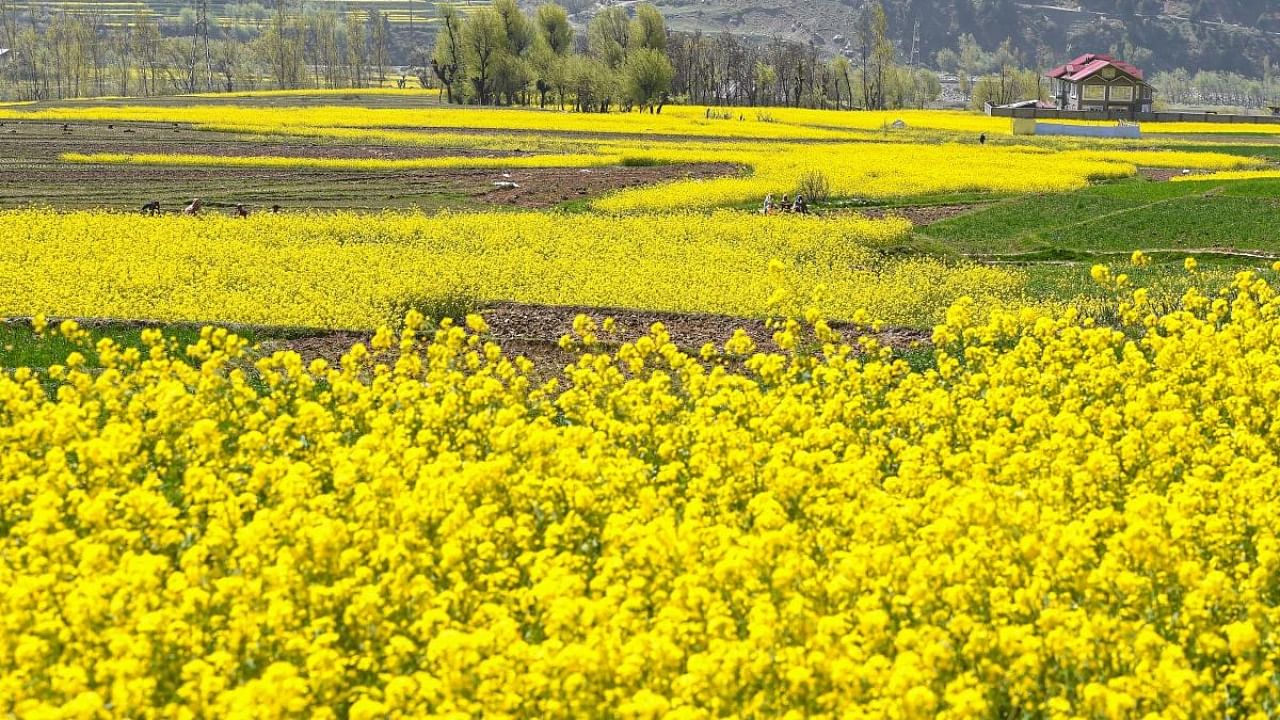
India has granted environmental clearance for indigenously developed genetically modified (GM) mustard seeds, paving the way for commercial use of its first GM food crop.
At a meeting on October 18, the GEAC, the country's regulator for genetically modified organisms, recommended the "environmental release of mustard hybrid DMH-11 for its seed production and testing as per existing ICAR guidelines and other extant rules/regulations before commercial release".
What is a hybrid crop?
A hybrid crop is a variant of a crop created by artificially combining two or more kinds of plants, which may also be within the same species of plant. Such hybrids could, in theory, provide higher yields, have greater disease resistance or have nutritional benefits that the base plant does not.
In the case of mustard, however, hybridisation can be difficult as it is a self-pollinating plant, in that the flowers of the plant contain both the male and female components. A similar problem can occur if one is attempting to hybridise crops such as wheat or rice, or fruit plants such as apricots. In this situation, as the pistil is fertilised by the stamen of the same flower, developing hybrids is harder as stamen of another plant cannot be used for the purpose.
How did scientists hybridise mustard?
In this circumstance where traditional hybridisation is not achievable, scientists at the Centre for Genetic Manipulation of Crop Plants (CGMCP) at Delhi University, led by Deepak Pental, adopted transgenics to develop the DMH-11 hybrid mustard. Transgenics refer to altering the genome of an organism by combining DNA strains from others.
For the mustard, it involved the use of genes isolated from Bacillus amyloliquefaciens, a soil bacteria. The first gene (barnase) in the process was used to turn one plant male-sterile, and subsequently, a second plant modified with another gene (barstar) was used to fertilise the first plant, according to a report by The Indian Express.
Why was hybridisation of mustard necessary?
India is the world's biggest importer of edible oils, and spends tens of billions of dollars a year on imports to fill more than 70 per cent of its demand from Argentina, Brazil, Indonesia, Malaysia, Russia and Ukraine. Hybridisation, with its theoretical increase in yield, could help cut the country's import bills.
According to The Indian Express, mustard varieties in India have a narrow genetic base, and the 'barnase-barstar' system enables breeding of hybrids from a wider range of mustards, including ‘Heera’ and ‘Donskaja’.
“We can also introduce new traits relating to resistance against disease (alternaria blight and stem rot fungus) or canola oil quality (zero/ low levels of erucic acid and glucosinolates, seen as negative from a health standpoint),” Pental told the publication.
What are the reactions to the GEAC's recommendation?
Many scientists and agricultural experts have called for faster clearance of GM crops as India's farming acreage shrinks because of rapid urbanisation and erratic weather that threatens output of staple foodgrains such as rice and wheat.
Those supporting commercial cultivation of GM crops say its benefits include greater food security due to increased yields, reduced costs for food production, reduced need for pesticides and resistance to pests and disease.
Former Agriculture Minister Sharad Pawar also made a strong pitch for use of genetically engineered crops, saying ignoring advances in crop science could adversely affect the country’s food security.
“India lately became complacent and started neglecting the developments in science, particularly the new genetics and breeding,” said Pawar, who served as the Union agriculture minister from 2004 to 2014.
On the other hand, GM crops do have their detractors. In the context of the GM mustard, Kavitha Kuruganti, the founder of the Alliance for Sustainable and Holistic Agriculture, said: "The claim that GM mustard will increase yield is not supported by the data submitted by the crop developers to the regulator."
In a statement issued on Wednesday, the Coalition for a GM-Free India said: "This compromises biosafety in serious and objectionable ways, and we ask the government not to move forward in allowing this dangerous herbicide tolerant food crop in India."
"GM mustard is a herbicide tolerant and toxic hybrid that will dramatically increase the presence of toxic chemicals in our food and soil and hence, impact health," said Rohin Kynar, Senior Agriculture Campaigner, Greenpeace India.
Also, RSS-affiliated Swadeshi Jagran Manch has opposed the recommendation, calling it "dangerous" and urged the Centre to ensure that the crop's seed is not allowed to be planted "now or ever."
(With agency inputs)